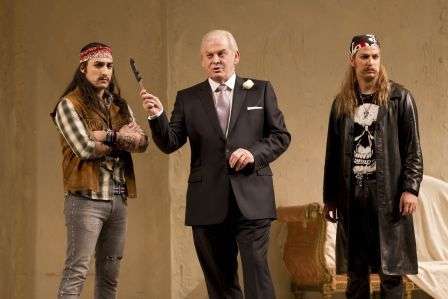|
Back
An Updating of An Updating London
Royal Opera House, Covent Garden
01/27/2012 - & January 30, February 2, 4, 7*, 10, 13, 2012
Wolfgang Amadeus Mozart: Così fan tutte, K. 588
Sir Thomas Allen (Don Alfonso), Charles Castronovo (Ferrando), Nikolay Borchev (Guglielmo), Malin Byström (Fiordiligi), Michèle Losier (Dorabella), Rosemary Joshua (Despina)
Royal Opera Orchestra and Chorus, Sir Colin Davis (conductor)
Jonathan Miller (director), Jonathan Miller with Tim Blazdell (set and costume designers), Jonathan Miller with John Charlton (lighting designers)

(© Johan Persson/ROH)
The Royal Opera’s winter season includes all three of Mozart’s great Italian operas with libretti by his most fruitful collaborator, Lorenzo da Ponte. Così fan tutte, the least famous of the three, rounds out the effort in this revival of Jonathan Miller’s production. In one respect Miller’s effort recalls his Metropolitan Opera production of one of the other Mozart-da Ponte collaborations, The Marriage of Figaro, still in repertoire there. As it is in that production, the backdrop here is an unfinished interior in a mild state of disorder. I still wonder what this sedate effect is supposed to represent, but it cannot be accused of distracting the audience, even if it is in an unattractive shade of yellow. Otherwise, the production updates the action to contemporary times. When Ferrando and Guglielmo go off to war, they wear standard European military fatigues and blue UN helmets. Their “Albanian” alter egos, which they must adopt to seduce each other’s betrothed in order to fulfill the conditions of their bet with the cynical Don Alfonso on the fidelity of women, look like bikers. For most of the evening, Fiordiligi and Dorabella sport casual outfits that just scream “casual Friday.” At the end, when they seem ready to marry the “Albanians,” they predictably appear as biker chicks. Their secretarial and bespectacled maid Despina looks slightly more officious. Alfonso is a bit better turned out. The wagered “zecchini” of the original libretto become “euros” in the supertitles. And in case no one has seen enough mobile phones in London lately, the entire cast use them, usually to no great effect, though, cleverly, Alfonso delivers one of his asides into one as though he is complaining to a confidant about the prospect of losing his bet. Despite this one twenty-first century innovation, there was really nothing about this Così that Peter Sellars did not do in his famous updated production of the opera twenty years ago.
A glorious vocal performance of Mozart’s music can make up for a lackluster production, but this was only partially in evidence. Michèle Losier’s rich mezzo drew out Dorabella’s part with great distinction and was well paired with the talented young American tenor Charles Castronovo, whose more tenuous start as Ferrando developed confidently into virtuoso lyric tenor singing in the second act. Nikolay Borchev’s Guglielmo produced some solid baritonal sounds and was well acted, but lacked a more than typical quality. Malin Byström’s edgy soprano underserved the beautiful role of Fiordiligi. The most active dramatic part in the opera falls to Despina; mezzo Rosemary Joshua acquitted herself rather well, contributing a fine if perhaps by necessity wiry quality to the role while hitting the essential comic notes. Now in his fifth decade of performing at Covent Garden, veteran baritone Sir Thomas Allen added a charismatic stage presence as Don Alfonso, even if the voice shows some weathered signs. Sir Colin Davis led a faultless orchestral performance.
Paul du Quenoy
|